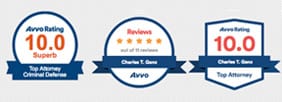Frequently Asked Questions (FAQs)
1. Someone I know was just arrested, what should I do now?
First call a lawyer you can trust, not one that Google suggests. A lawyer will have a recommended bondsman. A bondsman is no different than anything else, there are good ones and bad ones, so buyer beware of paying the first one you find. Also, in certain cases, the bond will be set too high, a good lawyer will know the amount is too much and advise the individual to wait so a bond reduction can be requested.
2. Do you charge for a consultation?
No, if you are serious about defending your case, I will sit down with you at no charge to discuss your case in detail.
3. How much do you charge?
Every case is different: different facts, different court, different county, different criminal history, etc. There is not a set fee for any case. A fee depends on the work involved in the particular case. I DO NOT quote fees over the phone or without a consultation. If the cost of representation is your biggest concern, I am probably not the lawyer for you. I run a low volume result-oriented practice and cannot offer the discounted rates of the high volume practitioners.
4. Do you offer payment plans?
Everything is negotiable on an individual basis. I do not have a set payment plan, but I am willing to discuss an individual payment schedule depending on the circumstances.
5. Do you represent Spanish speaking clients?
Yes, I have represented several individuals that did not speak any English. My full-time assistant is bilingual. (translate to Spanish)
6. What counties do you take cases in?
I will take a case in any county in the great State of Texas. I have handled cases in over 50 different counties in Texas, from as far north as Parker County and as far south as Cameron county.
7. I am guilty or it is my first arrest, should I hire a lawyer?
Absolutely! No one should ever enter a criminal courtroom with the idea of representing themselves. Abraham Lincoln said it best: He who represents himself has a fool for a client. Prior to being elected the 16th President of the United States, Abraham Lincoln was a criminal defense lawyer. His statement was true then and even more so today because of the collateral consequences that come with a criminal arrest, charge, or conviction on your record. In the modern day, computer databases keep records of everything and everyone. What does not seem like a big deal today, may end up being your worst nightmare in the future.
Whether you made a mistake or not, understand that the criminal justice system is not about whether you did or did not, BUT whether the State can prove you did beyond a reasonable doubt! A guilty conscious should have no bearing on whether you hire a lawyer!
8. What should I look for when hiring a criminal defense lawyer?
There is not an easy answer, much less a definitive one; however, here are some suggestions of things one may want to consider when hiring a criminal defense lawyer:
- Think of a lawyer as you would a doctor. Ask yourself, would I trust this person to operate on me e.g. cut open your chest? It may seem like a drastic comparison, but your freedom is as important as your life. Life without liberty is not a healthy life. You are your own best judge of character or if you are undecided, bring your family to meet with the lawyer.
- One of the critical times to judge a lawyers character is in your first meeting, in person meeting. How much of his time did he or she devote to you free of charge to discuss your situation? How many questions were asked about your background and future? How many detailed questions were asked about the events leading up to your arrest?
- Never hire a lawyer over the phone unless you have already met the lawyer. It is difficult, if not impossible, to truly evaluate someone without being face to face. I would not cross examine a witness over the phone because without seeing a person’s demeanor and body language, I cannot tell if they are credible.
- You should ask the lawyer about their experience with the charge, with the county, with the district attorney’s office and with the judge. You can also do your own research about a lawyer by using the internet. You can find a lawyers state bar number at the State Bar website:
Texas State Bar You can see if the lawyer has been disciplined on the State Bar website.You can also use the lawyer’s bar number to search their case history in some counties.
For example, on the Harris County District Clerks page (link below), you can search a lawyer’s case history by clicking the Criminal tab and entering the lawyers bar number.
http://www.hcdistrictclerk.com/edocs/public/search.aspx
For a list of some of the counties that have records online, go to the Helpful Links tab.Note: Cases that have been expunged will no longer show up as being handled by the lawyer. Arrest records of a charge can be erased if the person was found not guilty or if the charges were dismissed. An expunction erases or destroys the records of that person’s arrest. - Lawyer referrals from friends or past clients are one of the best ways to find a lawyer. First, you will know whether the lawyer got the case dismissed, whether the lawyer tried the case to a jury, whether there was a reduction, or whether the lawyer just settled with the first offer from the district attorney. Second, you will have private and personal feedback about the lawyer.
- Do not fall for the case records listed on a lawyers website. The case results tab that claim wins and/or dismissals on a lawyers website is cheap advertising. Lawyers pick and choose what cases to post and there is no verification that the case ever existed or what the circumstances of the case led to the dismissal or win. For example, I had a .32 blood test DWI case that involved an accident dismissed because, sadly enough, the police officer was killed in the line of duty. Now, that is not something to boast about, not something I am proud of, and certainly not something I am going to advertise on a website. Another example, a lawyer claims 3 dismissals on the case results page, but fails to mention they were dismissed because that unnamed client pled guilty to a felony charge. Bottom line, case results are cheap advertising and nothing more; do not be fooled!
- Ask about a lawyers case load and decide whether you want a lawyer that carries 100 cases at a time? It does not mean a lawyer cannot effectively handle 100 cases pending at one time, but everyone has the same amount of time in a given day or week, how much time will be given to your case. Generally speaking, the more a lawyer advertises, the more cases they carry at one time. Ask yourself, does the lawyer care about me or making as much money as possible. Finally, can you afford the lawyer? What financial arrangements is the lawyer willing to make with you? Are they manageable? As with everything in life, if the price is too good to be true, careful what you are buying.
9. How do I research a lawyer’s background or previous cases?
You should ask the lawyer about their experience with the charge, with the county, with the district attorneys office, and with the judge. You can also do your own research about a lawyer by using the internet. You can find a lawyer’s state bar number at the State Bar website:
Texas State Bar Number
You can see if the lawyer has been disciplined on the State Bar website.
You can also use the lawyers bar number to search their case history in some counties.
For example, on the Harris County District Clerks page (link below), you can search a lawyers case history by clicking the Criminal tab and entering the lawyers bar number.
http://www.hcdistrictclerk.com/edocs/public/search.aspx
For a list of some of the counties that have records online, go to the Helpful Links tab.
Note: Cases that have been expunged will no longer show up as being handled by the lawyer. Arrest records of a charge can be erased if the person was found not guilty or if the charges were dismissed. An expunction erases or destroys the records of that persons arrest.
10. Why don’t you have a Case Results page with previous cases?
Do not fall for the case records listed on a lawyer’s website. The case results tab that claims wins and/or dismissals on a lawyer’s website is cheap advertising. Lawyers pick and choose what cases to post, and there is no verification that the case ever existed or what the circumstances of the case led to the dismissal or win. For example, I had a .32 blood test DWI case that involved an accident dismissed because, sadly enough, the police officer was killed in the line of duty. Now, that is not something to boast about, not something I am proud of, and certainly not something I am going to advertise on a website. Another example, a lawyer claims three dismissals on the case results page, but fails to mention they were dismissed because that unnamed client pled guilty to a felony charge. Bottom line, case results are cheap advertising and nothing more; do not be fooled!
11. Why am I on probation when I just got arrested? Am I not presumed Innocent?
The law requires that a jury presume your innocence, as well as, the court. However, organizations such as MADD have agendas that have begun to erode our constitutional protections. Lobbying for safety, the legislature has passed several statutes that allow a court to impose bond conditions such as requiring an Ignition Interlock be placed on the vehicle of someone accused of DWI. The purpose of a bail is simply to secure the appearance of the accused in court. Over 30 years ago, the US Supreme Court held that preventive detention measures do not violate the 8th or 14th Amendment. At one time, it was the safety of a victim and/or alleged crimes of violence that the courts were concerned about. Today, non-violent crimes, first offenders, and all people accused of a crime can be subjected to pre-trial bond conditions under the safety of the community reasoning. Statues are now codified giving the court express power to supervise an accused at the cost of the accused. Many times it is not fair, but pre-trial courtesy supervision as it is so eloquently phrased is here to stay. In fact, the requirements of the supervision are becoming more common, more routine, and more stringent every day. There are times when a court goes too far and your lawyer should fight to make the conditions or cost of bond reasonable.
12. How can I be arrested for DWI when I was not even drinking?
Driving While Intoxicated in Texas encompasses any and all types of impaired driving.
Intoxicated is defined as not having the normal use of mental or physical faculties by reason of the introduction of alcohol, a controlled substance, a drug, a dangerous drug, a combination of two or more of those substances, or any other substance into the body OR having an alcohol concentration above .08. Some states have different charges or different definitions, such as DUI (Driving Under Influence) or OWI (Operating While Impaired). In Texas, DWI is the only definition used, except for Minors under the age of 21.
13. What is difference between DWI/DUI? Is DUI serious for a Minor?
In Texas, DUI or Driving Under the Influence is only for a minor under the age of 21 that is stopped after consuming alcohol, but whom is not intoxicated. A DUI in Texas is a Class C Misdemeanor which is equivalent to a traffic ticket, but has serious consequences with respect to the minors driving privileges, driving record, and criminal background. A DUI might be a Class C in a Municipal Court, but the consequences of a conviction are far different than your everyday traffic ticket.
14. I was arrested for DWI, can I drive? Officer took my license?
Generally speaking, yes you can drive so long as your driving privileges were in good standing before you were arrested. When the Officer confiscates your drivers license, you are supposed to be served with a Notice of Suspension / Temporary Driving Permit. Often times, police officers will either forget to give the person the notice or its gets lost when released from jail. However, you are presumed to have been given notice whether you have the paperwork or not. Call a lawyer immediately to get advice. YOU ONLY HAVE 15 DAYS TO ACT OR YOUR LICENSE WILL AUTOMATICALLY BE SUSPENDED.
15. What does ALR mean?
ALR is the acronym for Administrative License Revocation. If a suspect refuses to submit to a breath or blood test or submits but has a concentration of .08 or more, the person will be served with a Notice of Suspension. After being served with Notice of Suspension, you have 15 days to request an ALR hearing to contest the proposed suspension.
16. The police officer did not read me my Miranda rights?
Many of arrests never reach the time where Miranda rights are required. On TV, the police officer will always give Miranda warnings at the time the person is being handcuffed for the dramatic effect. If I were a police officer, I would give Miranda warnings like seen on TV, but most police officers will only give Miranda warnings when required to do so by law and many do not even do it then. Miranda warnings are required to be given to a suspect that is placed in custody and after being placed in custody, are asked questions that may illicit incriminating responses i.e. something other than regular booking questions.
a. However, courts carved out an exception for DWI, police officers can ask a suspect to submit to a breath or blood test after being placed in custody and without Miranda warnings being given.
17. What penalty group does __(drug)__ fall into?
| TEXAS DRUG PENALTY GROUPS and CLASSIFICATIONS | ||||||
|---|---|---|---|---|---|---|
| Penalty Group 1: | Penalty Group 1A: | Penalty Group 2: | Penalty Group 2A: | Penalty Group 3: | Penalty Group 4: | Marijuana / Marihuana: |
| Synthetic chemical compounds mimicking the pharmacological effects of naturally occurring cannabinoids | LSD |
|
Synthetic chemical compounds mimicking the pharmacological effects of naturally occurring cannabinoids |
|
|
Not classified in a penalty group; it has its own penalties broken down by whether simple possession or possession with delivery |
18. What are the punishment ranges for Penalty (-) Drugs?
| PUNISHMENT RANGES FOR POSSESSION OF DRUGS | |
|---|---|
| Penalty Group 1 Drugs | – Less than 1 gram; State Jail Felony – 1-4 grams; 3rd Degree Felony – 4-200 grams; 2nd Degree Felon – 200-400 grams; 1st Degree Felony – More than 400 grams ; 1s t Degree Felony w/ 10 year minimum up to 99 years in prison and a fine not to exceed $100,000 |
| Penalty Group 1A Drugs | – Less 20 abuse units of controlled substance; State Jail Felony – 20-80 abuse units; 3rd Degree Felony – 80-4,000 abuse units; 2nd Degree Felony – 4,000-8,000 abuse units; 1st Degree Felony – More than 8,000 abuse units; 1st Degree Felony w/ 15 year minimum up to 99 years in prison and a fine not to exceed $250,000 |
| Penalty Group 2 Drugs | – Less than 1 gram; State Jail Felony – 1-4 grams; 3rd Degree Felony – 4-400 grams; 2nd Degree Felony – More than 400 grams; 1st Degree Felony w/ 5 year minimum up to 99 years in prison and a fine not to exceed $50,000 |
| Penalty Group 3 Drugs | – Less than 28 grams; Class A Misdemeanor – 28-200 grams; 3rd Degree Felony – 200-400 grams; 2nd Degree Felony – More than 400 grams; 1st Degree Felony w/ 5 year minimum up to 99 years in prison and a fine not to exceed $50,000 |
| Penalty Group 4 Drugs | – Less than 28 grams; Class B Misdemeanor – 28-200 grams; 3rd Degree Felony – 200 -400 E33; 2nd Degree Felony – More than 400 grams; 1st Degree Felony w/ 5 year minimum up to 99 years in prison and a fine not to exceed $50,000 |
| ***Note: weight is the aggregate weight of the drugs, i.e. includes any adulterants or dilutants | |
19. What is the punishment range for a misdemeanor?
| CLASS | CONFINEMENT | OPTIONAL FINE | |
|---|---|---|---|
| 1 | Class A misdemeanor Pen §12.21 | Up to 1 year in county jail | $4,000 maximum |
| 2 | Class B misdemeanor Pen §12.22 | Up to 180 days in county jail | $2,000 maximum |
| 3 | Class C misdemeanor Pen §12.23 | None | $500 maximum |
20. What is the punishment range for a felony?
| 1 | DEGREE | CONFINEMENT | OPTIONAL FINE |
|---|---|---|---|
| 2 | Capital Felony Pen §§8.07 (c), 12.31 (a) (1), (b) (1) [younger than 18] | Life in Prison | NONE |
| 3 | 1st degree felony Pen §12.32 | 5 to 99 years or life in prison | $10,000 maximum |
| 3 | Class C misdemeanor Pen §12.23 | None | $500 maximum |
| 4 | 2d degree felony Pen §12.33 | 2 to 20 years in prison | $10,000 maximum |
| 5 | 3d degree felony Pen §12.34 | 2 to 10 years in prison | $10,000 maximum |
| 6 | State-jail felony Pen §12.35 | 180 days to 2 years in state jail | $10,000 maximum |
21. The police took my car, money and property, can they do that?
Yes they can and they often do. The state of Texas and local law enforcement agencies make millions of dollars by seizing people’s assets. The state can seek forfeiture of any property that falls into the definition of contraband. In Texas, contraband is defined as property of any nature, including real, personal, tangible, or intangible, that is: used in the commission of any first or second degree felony under the Penal Code or falls under the laundry list of criminal offenses subject to forfeiture in Chapter 59 of Code of Criminal Procedure. DO NOT WASTE TIME! Call an experienced lawyer immediately. Time is critical in defending yourself against forfeiture. In fact, the State proceeds with so many forfeitures initially because too many people choose not to fight the state or have an inexperienced lawyer that does not advise the client to fight or does not know how to fight.
22. What is an expunction?
An expunction is a civil lawsuit that requires the petitioner i.e. the person arrested to sue all parties that have records of the arrest. If the petitioner meets all of the elements and is entitled by law, the parties will either enter into an agreement or a show cause hearing is held and the judge rules on whether to grant the expunction. Expunctions are the most important aspect of a successful defense of a criminal charge because whether you are found not guilty or the case was dismissed, without an expunction, the arrest and all records of the case will remain on your permanent record and can be used against you in the future. Expunctions should only be done by an experienced lawyer.
Obviously, a lawyer that knows how to get the parties to agree to an expunction is always better than one that does not. An expunction is a civil lawsuit and jeopardy attaches or in civil law, res judicata i.e. if an expunction is filed and improperly handled, the petitioner can be barred from filing the same expunction. It must be done right the first time.
23. Am I eligible for an expunction?
Only cases that were dismissed or resulted in an acquittal i.e. the judge or jury found you not guilty are eligible to be expunged. Every case and every county is different, some charges have a waiting period and others do not. An experienced lawyer will know whether you are eligible.
If you agreed to deferred adjudication on a Class B misdemeanor or higher, you are NOT ELIGIBLE for an expunction but may be eligible for non-disclosure, which hides the records from public viewing.






